Intermittent fasting is a prevalent weight loss technique that has been increasing in popularity in recent years. But what is intermittent fasting, and is it good for weight loss? The good news is that intermittent fasting can be a great way to lose weight, but it’s not the only way to do so. It helps to have a basic understanding of intermittent fasting to determine whether or not it’s a good strategy for your goals.
What Is Intermediate Fasting?
The restriction for weight loss with intermittent fasting comes from eating all calories within an 8-hour window each day. This means you eat no more than 500 calories during this time frame. If you are trying to lose fat, then you will need to restrict carbohydrates as well. Carbohydrates make up about 50% of our daily caloric intake.
Your weight loss journey starts by choosing which type of dieting plan works best for you. Low carb, keto, paleo, vegan, vegetarian, etc., are all weight loss methods. They all have their advantages and disadvantages. Some people succeed with specific plans while others do not.
You may want to try several before finding the right fit for you.
When we talk about intermittent fasting plans, we mean restricting food consumption to specific hours throughout the day. In other words, if you fast for 16 hours, you would consume all of your meals, outside the fasting period, between 12 pm – 6 pm. During these times, you could choose to either skip breakfast entirely or eat whatever foods you like. However, most experts recommend skipping breakfast because it makes it easier to adhere to the rest of the protocol.
When you first start intermittent fasting, you might feel hungry at odd times throughout the day. That’s normal!
How To Lose Weight Fast By Fasting?
Your body weight fluctuates based on how much you eat and when you eat. So, even though you aren’t consuming any calories, your body still thinks you’re getting enough energy to function correctly. As long as you don’t overdo it, you should see some results after just two weeks. After four weeks, you’ll notice significant changes in your metabolism and overall health.
If you decide to go ahead with intermittent fasting, here’s what you need to know:
1) Don’t starve yourself. Your body needs fuel to work correctly. When you cut back on calories too drastically, your body goes into starvation mode and slows down digestion. This causes cravings and hunger pangs later on. Instead, focus on healthy snacks such as nuts, fruits, vegetables, protein shakes, etc.
2) Drink plenty of water. Water keeps us hydrated and also flushes toxins through our system. Make sure you drink at least half your total calorie intake in ounces every single day.
3) Eat smaller portions. Most people tend to overeat when they get home from work. Try having dinner earlier, instead of 7 pm. Or, opt for lunch rather than dinner. These minor adjustments help keep you full longer and prevent binge eating.
4) Exercise regularly. Even if you don’t exercise now, adding 30 minutes of cardio per week will boost your metabolic rate and burn extra calories. Start slow and build up gradually.
Examples Of Intermittent Fasting
Your baseline body weight is a good indicator of whether or not you can successfully implement intermittent fasting. The average person weighs around 150 pounds. A woman who weighs 100 lbs has a BMI of 25.0. Someone weighing 200 lbs has a BMI of 27.5.
A man who weighs 180 lbs has a BMI that falls under 23.9. Women who weigh less than 110 lbs have BMIs below 24.9. Moderate weight loss and metabolic health improvements occur within this range. If you fall outside this range, you probably won’t lose fat without making significant lifestyle changes.
Your biggest meal during an 8-hour window should contain roughly 40% of your daily caloric requirement. You may want to experiment with different percentages until you find one that works best for you.
For example, let’s say you usually eat 1,000 calories each day. Then, you’d aim to limit your most important meal to 400 calories. If you do so, you wouldn’t be starving yourself, but you’d still be limiting your caloric restriction intake.
Meal frequency doesn’t matter all that much either. Some studies suggest that skipping breakfast isn’t ideal because we naturally wake up hungrier than usual. However, others show no differences between those who skip meals versus those who eat three square meals per day.
Potential health benefits include:
- Lowering blood pressure
- Improving cholesterol levels
- Reducing risk factors associated with heart disease
- Losing belly fat
- Boosting immune response
- Increasing muscle mass
- Decreasing inflammation
How Long Should You Do Intermittent Fasting?
The answer depends on what you want to achieve. If you’re going to lose weight, you should do intermittent fasting for at least two months. Your ideal weight may vary depending on your height and age. But most health professionals agree that an adult male should aim for between 140-160 lbs while women should try to stay between 120-130 lbs.
Long-term sustainability and health effects are other considerations. Some studies suggest that the more time we spend in a caloric deficit, the better off we’ll be in the short term only.
Metabolic health benefits start showing themselves after about six weeks. However, many experts recommend doing intermittent fasting for eight weeks before beginning a healthy diet plan. That way, you give your body time to adjust to the new routine.
What Are Some Disadvantages Of Intermittent Fasts?
Meal skipping isn’t always easy. It takes practice and willpower to stick to it long enough to see results. And some people find that their bodies crave food during certain times of the day. They feel hungrier at night, which makes them eat even though they’re already satisfied. Others experience headaches, dizziness, fatigue, irritability, mood swings, and brain fog.
If these symptoms persist, talk to your doctor. They might prescribe medication to treat any underlying conditions.
Having balanced meals throughout the day is also essential. Eating too little or too often can lead to overeating later in the day when hunger levels strike again. This could cause cravings and binge eating.
If you struggle with these issues, consider trying out a ketogenic diet instead. The keto diet involves drastically reducing carbohydrates and increasing fats. Many people use coconut oil as part of their regimen. Coconut oil contains medium-chain triglycerides, which help burn stored fat faster.
Fasting Plans For Beginners
Blood glucose levels drop dramatically when we fast. When this happens, our brains release growth hormones called insulin-like growth factors. This growth factor helps us build lean muscle tissue and increase bone density. In addition, it stimulates thyroid activity and increases energy production.
Some research suggests fasting triggers autophagy, where cells break down damaged proteins and recycle nutrients into usable substances.
This means less stress on those systems, making it easier for the body to heal itself.
Intermittent fasting has improved cardiovascular function by lowering bad LDL cholesterol and raising good HDL cholesterol.
It also reduces oxidative damage from free radicals. Oxidative damage occurs over prolonged periods.
Conclusion
In conclusion, intermittent fasting for weight loss as an alternative to traditional diets is gaining popularity among fitness enthusiasts worldwide. While there aren’t many scientific studies yet available regarding its effectiveness, anecdotal evidence shows that it works well for some individuals who have tried it.
However, if you decide to go ahead with intermittent fasting, make sure you consult your physician first. There’s no harm in giving it a shot, but you want to get the green light from your doctor before pursuing calorie-restricted diets.
FAQs for Is Intermittent Fasting Good For Weight Loss
How Much Weight Can You Lose In A Month With Intermittent Fasting?
Incorporating a healthy, well-balanced diet as a strategy for your meal plan will be vital to losing weight and keeping it off.
The best way to lose weight quickly is through intermittent fasting. The amount of weight you can lose in a month using periodic fasting plans vary depending on how much you weigh now.
For example, if you are currently 200 pounds overweight, you should aim to lose about 10% of your total body weight per month.
You may need to adjust this goal based on whether you exercise regularly or not as well.
Is Fasting Good To Lose Belly Fat?
Insulin levels play a role in regulating blood sugar levels. It’s produced naturally by the pancreas after digestion begins. Avoiding junk food and other processed foods can modify your body composition towards more desirable results.
When you eat high-carb meals, they cause spikes in insulin levels. These surges lead to higher amounts of calories being burned up as fuel rather than converted into glycogen.
As such, losing belly fat becomes harder because your metabolism slows down due to these fluctuations.
On the flip side, eating low-carb meals causes lower insulin levels, leading to slower metabolic rates. As a result, you burn fewer calories throughout the day.
Fast Food Statistics
Source: (thebarbecuelab.com)
Why Is Fast Food Bad for You?
Source: (newhealthadvisor.org)
[wps_products product_id=”1638122029091″ html_template=”product.php”]






